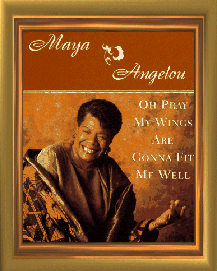In 1994 Maya Angelou spoke in Oakland. In a low voice she wove for her audience a night of magic with words of poetry, wisdom and insight.
A year before the entire country to Maya Angelou read her poem, "On the Pulse of Morning," at President Clinton's 1993 inauguration.
Her poetry is much like her prose -- beautiful, sad and strong.
"I Shall Not Be Moved"
Random House, 1990
"I Shall Not Be Moved" is a book of poems which relates to the issues of contention, pain, love, loss and survival.
The narrators vary, bringing out images we associate with the struggle of being black, being a woman and being human.
In her poem, "Human Family," Angelou says, "We are more alike, my friends, than we are unalike."
Titles of these poems include, "Equality," and "These Yet to be United States." This collection of poetry is honest and moving. It accepts the pain of humanity as natural, and speaks with a hopeful voice for a loss of ignorance.
"Now Sheba Sings the Song"
With Art by Tom Feelings
E.P. Dutton/Dial Books, 1987
One poem -- lovely and touching. The imagery is tangible, the emotion strong and proud. "Now Sheba Sings the Song" is told from the view of a black woman, or maybe many black women, depending on the interpretation. It accompanies wonderful illustrations by artist Tom Feelings.
The book started as a collection of drawings. The pictures are of women, all of whom "have Africa's blood flowing through them," says Feelings in his introduction.
The illustrations are heartfelt. Some are simple and some are complex. All of them display the beauty that is woman.
Together, the drawings of Feelings and the words of Angelou create an affecting piece -- a treasure.
Angelou dedicates the book: To all my black, brown, beige, yellow, red, and white sisters.
"Just Give Me a Cool Drink of Water 'Fore I Diiie"
Random House, 1971
There are two sections in this book, each of which contains poetry about hope and pain.
The first section, "Where Love Is a Scream of Anguish," is a group of poems about the agony of love. Like memories, these poems are bitter and revealing.
"Come you death, in haste, do come
My shroud of black be weaving,
Quiet my heart, be deathly quiet,
My true love is leaving" is a stanza from Angelou's poem, "The Gamut."
The second section, "Just Before the World Ends," is about racial differences and world affairs. Subjects range from riots to junkies to the drop of the bomb, and deal with prejudice, fear and guilt. Many of these poems are written with a humor that is biting and tragic.
I think the most impressive thing about Angelou's poetry is that it is purely honest. It is able to be graceful and elegant while, at the same time, it is poignant and true.
Like Maya Angelou's autobiographies, these poems are deeply felt and imagined.
